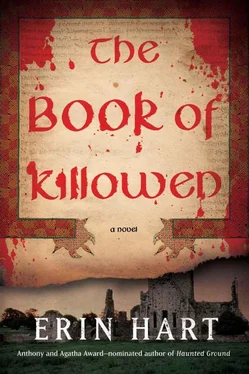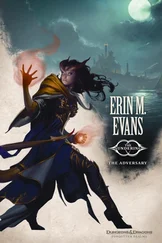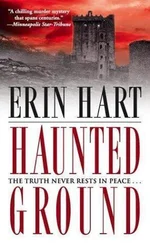Anthony nodded, and Martin Gwynne placed the codex carefully into Niall Dawson’s outstretched hands. The cover was rather ordinary, plain leather, more like an envelope than a bound cover. Apart from the one scratched design, there was no gaudy gold or stamped embellishment of any kind. Dawson gingerly undid the buttons and opened the wrapper. His eyes glinted with the curator’s heightened passion, a feverish curiosity bordering on greed.
Gwynne said, “I think you may be surprised at what you find inside.”
Cormac felt his breath halt as Dawson lifted the front cover to find a page inscribed in Latin. It began with a fantastically decorated capital and contained several margin notes in a tiny hand. “Looks like insular minuscule,” Dawson said, his voice filled with awe. “The text is definitely not Psalms. And am I mistaken in thinking there are two hands here?” he asked Gwynne.
“No indeed. The first part of the book has been set down by two different scribes, but the primary hand disappears about two-thirds of the way through. The last portion is completed by the second scribe. Some people know him by the name Nisifortinus—”
Dawson’s head turned sharply. “You realize what you’re saying?”
“I do,” said Gwynne. “And as I’ve had ample time to study the manuscript, I feel no qualms about making that claim.”
“I wish I knew what the hell you were talking about,” Cormac said.
Dawson turned to the title page and read aloud: “Periphyseon. Liber sextus…” Dawson’s voice wavered when he spoke again. “My God, you know what this means?”
“That last bit is ‘Book Six,’” Cormac said. “If I’m remembering right.”
“But there were only five books in Periphyseon ,” Dawson said. “There was never any mention of a sixth book, only a note from Eriugena himself at the end of Book Five that he hadn’t covered all the topics that he’d promised to write about.” He began to turn the pages, ever so gently, studying the handwriting on the vellum surface. “If this is truly authentic, it’s earth-shattering. In all sorts of fields—philosophy, history, paleography. I can’t even get my head around it properly.” He turned to Martin Gwynne. “If this truly is Eriugena’s last work, are you thinking he finished it here, in Ireland?”
“Not quite. I’m afraid he might have died before he could complete it,” Gwynne explained. “I’ve gone over the handwriting again and again.” He turned to Cormac. “There are often two Irish hands in Eriugena’s major works, two individuals that paleographers have dubbed i 1and i 2. Some scholars think one of them might be Eriugena himself, and the second his pupil and protégé, the man some call by the name Nisifortinus, for the way he introduced his additions, ‘Nisi forte quis dixerit’ —Unless, perhaps, anyone shall say that… I’ve often wondered if this mysterious second hand wasn’t perhaps founder of the monastery at Cill Eóghain. As I said, the first hand disappears partway through this book, and it’s completed by the second hand. I think you may find, when you have a closer look at your bog Psalter, that it may be the work of Nisifortinus as well.” Gwynne paused. “I have a theory—entirely unprovable, but plausible all the same, I think—about what transpired here back in the latter ninth century. You’ll forgive my wild speculation. I am only a scholar, after all, and not a scientist.”
“Enlighten us, please,” Dawson said.
“I see two men, scholars and scribes, camped at the edge of this bog. They had come here to withdraw from the world of men, returning to the place from which they’d sprung. But they were not alone. One day while his young companion is absent, the older man is approached by the men who’ve followed him here, paid ruffians who fall upon him and stab him to death and fling his body in the bog. Since your recent discoveries, I have imagined the book and satchel flung after him, perhaps in frustration, because a Psalter, wonderful though it might have been, was not the book the assassins sought. They were after a book full of dangerous, heretical ideas, mistaken in the notion that they could destroy those ideas by destroying the written word.”
“And where was this dangerous book, sought by assassins?” Dawson asked.
“Perhaps the younger man had it,” Gwynne said. “One book, one satchel looks much like another. It’s true even today. But as I said, I have no proof. I merely speculate.”
Cormac said, “So, if our bog man is indeed this philosopher, Eriugena, what reason would anyone have had for killing him? Was there such great harm in what he wrote?”
“His ideas questioned the very foundations of the church in Rome,” Gwynne said. “To church theologians, Eriugena’s writings skirted too close to pantheism. They were condemned by two separate councils in his lifetime. His argument against predestination, his thoughts about the presence of God in nature, about the nonexistence of evil—these things were considered subversive, heretical, dangerous. They remain so to this day.”
“So how did you come to know that Anthony was in possession of this book?” Dawson asked.
“I had noticed that Anthony shared a name with the heirs of the termon lands, the Ó Beigléighinns of Killowen. And I thought it a little strange that Anthony hadn’t learned his letters, being the descendant of scholars. Perhaps it should have been no surprise that schoolteachers always underestimated Anthony, because of his tics and stammers. But as it turned out, here was a man possessed of knowledge that none of his ignorant schoolteachers dared dream of. I heard him speak it, when he didn’t know I was listening.” He cast a weary glance at his friend. “Would you grace us with a bit of that knowledge now, Anthony?”
Beglan had been standing to one side, an arm’s length from them, watching the commotion over the ancient book, listening to the story. Now he looked self-conscious, as if he’d rather have been anyplace but the spot where he was standing. “Where shall I stuh-start?” he asked Gwynne, his jaw flexing as he spoke.
“What about ‘Si enim libertas naturae,’ ” Gwynne said gently. “Don’t mind us, Anthony. Just imagine you’re out with the beasts.”
Cormac felt a twinge of memory, harking back to the strange sounds coming from Beglan as he drove the cattle down the lane. Anthony closed his eyes and began to sway slightly as he recited the words from memory: “Si enim libertas naturae rationabilis ad imaginem Dei conditae a Deo data est…”
Gwynne turned to what seemed to be a familiar page in the book, marking the words with his finger. Cormac and Dawson could only stand by as Beglan continued: “necessario omne quod ex ipsa libertate evenit, malum seu malitia recte dici non potest—”
It was the same passage that was on the wax tablet, the one they’d brought to Gwynne for translation. And it was only after Anthony finished his recitation that Cormac also realized that the tics and stammers had ceased as the Latin words fell from his lips. Perhaps repeating the text of this book over and over like an incantation somehow stopped the errant brain waves that caused his muscles to contract, his tongue to shudder, his voice to come unbidden.
“Is that your cure?” Cormac asked. “That recitation?”
“N-n-n-not exactly,” Beglan said. “You take the book and duh-duh-dip it in the basin, and then get two cuh-cupfuls of that down yeh—”
Dawson couldn’t hold his tongue. “Wait, you put this book into water?” He looked down at the manuscript in his hands.
“Aye, to buh-bless the water,” Beglan replied. “Does no harm.”
Gwynne said, “He’s right about that. Iron gall ink doesn’t just float upon the surface, you see—it bites into the page. Gallotannic acid bonds with vellum. That’s why this ink cannot run. Not anymore.”
Читать дальше












